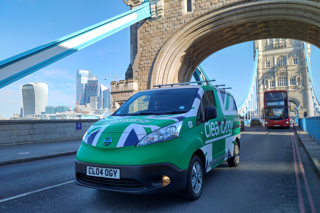Author: Alain Costa, head of fleet Europe at ChargePoint
It won’t be business as usual for many companies emerging from the global pandemic.
In a year that saw some industries shrink by as much as 90% in the early months of the crisis, others have fared much better.
Online sales in the UK were up £4.5bn in 2020, with 25% of British consumers saying they plan to continue taking advantage of the convenience of Internet shopping even as life returns to normal.
That offers delivery and logistics fleets, which transported some 2.8 billion parcels last fiscal year, a huge opportunity to continue to expand their vehicle fleets and redesign their logistics schemes through smaller, inner-city depots with new types of smaller vehicles, all whilst expanding and continuing to grow their total business for the foreseeable future. Increasingly, those new vehicles will be electric.
And, yet, whilst industry leaders such as Amazon, DPD, FedEx and UPS have already made significant commitments to fleet electrification, many of their ecosystem partners — smaller operations with non-branded vehicles, independent contractors and private drivers (and even those larger service providers who serve the logistics giants) — whom they hire to help out during peak demand times, have not.
That’s a reason for concern in an industry that has led during the receding crisis and will be on the front lines of the coming one.
With climate change reemerging as the preeminent threat to humanity, the larger fleets understand that electric vehicles (EVs) aren’t only good for the planet, they’re a brand advantage.
A lower total cost of ownership (TCO), including reduced fuel and maintenance costs, superior reliability and longer lifespans of EVs compared to their internal combustion engine (ICE) counterparts, make electrification a competitive advantage.
This is without mentioning the multiple tax benefits, subsidies and access to Ultra Low Emission Zones (ULEZ) EV’s offer.
That’s why, even though timelines vary, nearly all the major industry players (as well as ridesharing leaders Uber and Lyft) have promised 100% zero-emission fleets in the coming years.
Unfortunately, those partners the industry giants rely on for crucial last-mile deliveries – and are often a brand’s representatives to end customers – have little incentive to electrify today.
Limited vehicle availability and large CapEx outlays have historically put EVs out of reach for many smaller operators.
But that resistance to electrification has increasingly put them at odds with their main benefactors, many of whom are considering stronger policies and penalties to require EVs sooner rather than later.
However, there are several factors beginning to coalesce that may render the need for the industry to exert more control over its expanded ecosystem moot.
Those who rely on large fleets for their livelihoods are facing three main drivers that should help speed vehicle electrification. They are:
Mandates: Twenty-four European cities with a cumulative population of 62 million people plan to ban diesel vehicles entirely by 2030.
Thirteen of those (including London, Rome and Barcelona) will also eliminate all ICE vehicles, including petrol, from city centres as well. Smaller fleets will simply have no choice but to electrify in order to remain in business.
Incentives: Fortunately, the stick of government mandates here in the UK comes with a carrot.
Incentives such as vehicle grants and the generous new “super-deduction,” which provides first-year tax relief of 130% for qualifying infrastructure such as EV charge points will encourage many fleets to electrify more quickly than they otherwise might have.
Vehicle availability: A lack of electric models has been oft-cited as a barrier to fleet electrification. No more.
Hundreds of electric models, including dozens of cargo and delivery vans, are set to hit roadways beginning this year.
The sheer volume of new EVs should create a robust secondary market within the decade. At that point “electric vehicles” will simply be “vehicles.”
From the increasing threat of climate change to the impact of fossil fuels on public health, it’s in the business's best interest to stay ahead of the curve when it comes to vehicle electrification.
The delivery and logistics industry already knows this and, soon enough, everyone else will too.



















Login to comment
Comments
No comments have been made yet.